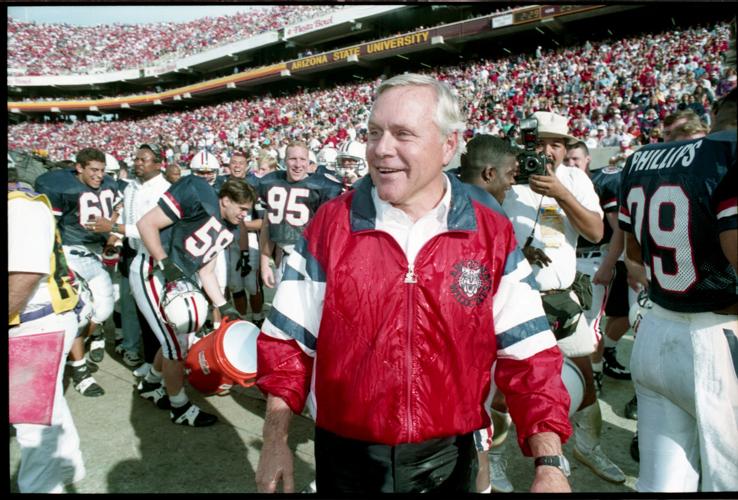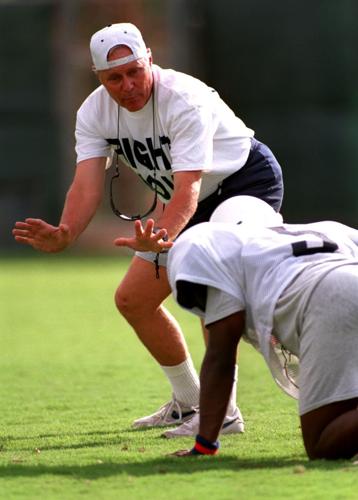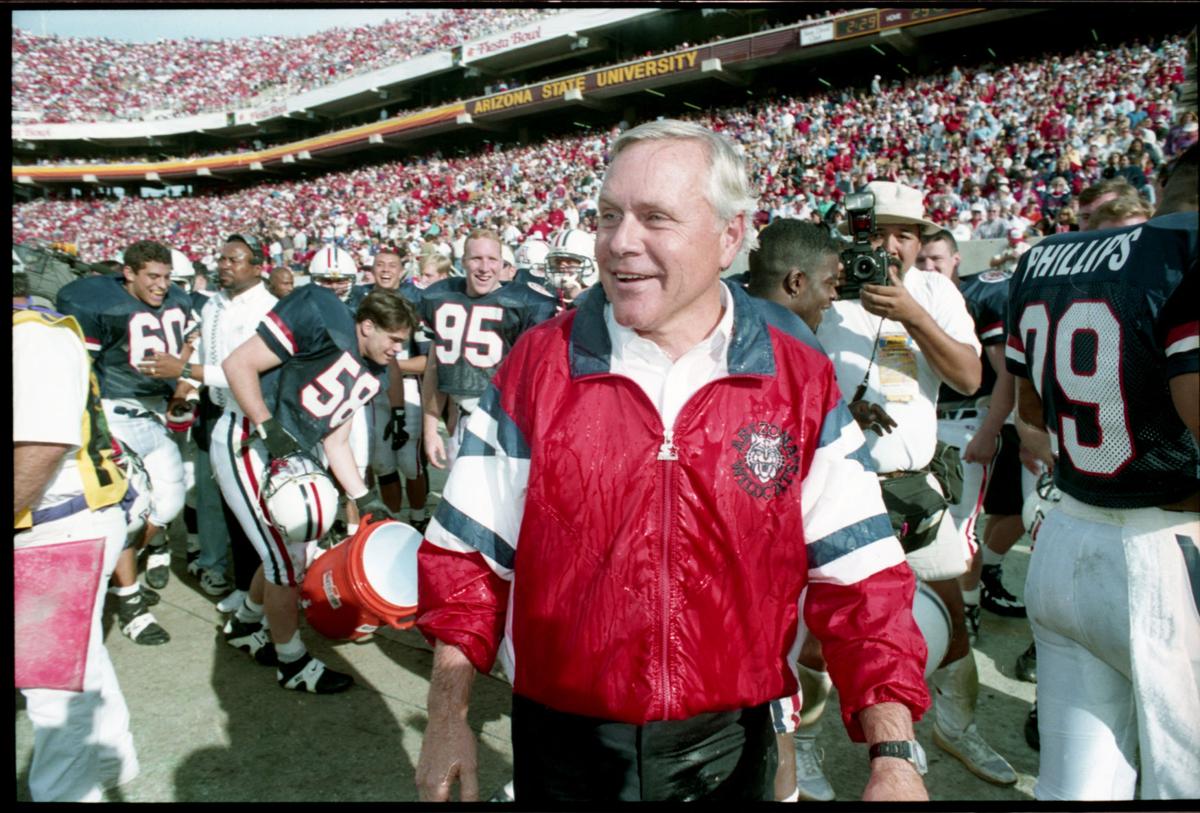This isn’t the first time the Star has written about the need for Arizona football to re-establish the so-called Polynesian pipeline. It keeps coming up because the problem hasn’t been solved.
The Wildcats have had a smattering of Polynesian standouts since the Dick Tomey days. But it hasn’t been a staple of team building as it was under Tomey, whom Utah coach Kyle Whittingham once referred to as the “godfather” of Pacific island recruiting.
UA athletic director Dave Heeke suggested Friday that the university will strive to connect to its past when it names a new head coach in the coming days. What better way than to hire someone who will re-establish the Poly pipeline?
“It’s all about where the head coach puts his emphasis,” said former Arizona tight end Brandon Manumaleuna, who played for Tomey and whose father is Samoan. “If you have a head coach who’s dealt with Polynesians, he knows the type of athletes they are. You’ve just got to have a coach who’s willing to do it.”
Many of the coaches linked to the UA opening fit that description. Navy coach Ken Niumatalolo, San Jose State coach Brent Brennan, BYU coach Kalani Sitake and Oregon co-defensive coordinator Joe Salave’a have either Polynesian roots, a connection to Tomey or both.
Tomey came to Arizona from Hawaii, where he established relationships that would last a lifetime. Tomey, who died in 2019, later became the selection committee chairman for the Polynesian Football Hall of Fame.
“He was the first coach in Division I college football to actually go to American Samoa, when he was at Hawaii,” said Rich Tomey, Dick’s son. “That really resonated with the culture. He really connected with that population.”
After he came to Arizona, Tomey continued to recruit the Pacific islands and the Polynesian community on the mainland.
“I know for a fact it can be done,” said George Malauulu, who played quarterback for Tomey and the Wildcats from 1989-92. “They’re just barking up the wrong trees.”

University of Arizona quarterback George Malauulu scores against Baylor during the John Hancock Bowl in El Paso, Texas on Dec 31, 1992.
Malauulu is the president of the AIGA Foundation, a non-profit organization that assists Polynesian student-athletes. He’s a big supporter of Salave’a for the UA job.
“He’s grounded,” Malauulu said. “He knows what needs to be done. He’s been mentored by our fearless leader, Coach Tomey. He’s a recruiter.”
Salave’a has scored many recruiting victories in the Polynesian community at Oregon and his previous stop, Washington State. One could argue that he wouldn’t be able to bring four- and five-star players such as Penei and Noah Sewell to Arizona, because the UA just doesn’t swim in those waters.
But it’s not as if every Polynesian star in the Pac-12 was a four-or five-star recruit. Nor is it the case that they all play for Oregon, USC, Washington and Utah.
Salave’a recruited Hercules Mata’afa to Washington State. He’s currently with the Minnesota Vikings. He was a three-star recruit.
Washington breakout defensive star Zion Tupuola-Fetui, the Pac-12 leader in sacks entering Saturday, also was a three-star prospect. The Huskies unearthed him in Pearl City, Hawaii.
In their 2021 signing classes, Utah has four three-star players of Polynesian descent, Washington has three and Washington State has two.
“Coach Tomey laid the blueprint,” Manumaleuna said. “You see Polynesian players making an impact (across the country). Not just linemen, but skill guys.”

University of Arizona head football coach Dick Tomey working with a player during practice in 1994.
Rich Tomey grew up in Hawaii. He found his neighbors to be tough, family-oriented people.
Manumaleuna grew up in Los Angeles, the son of a Samoan father and an African-American mother. He coached many Polynesians as an assistant at L.A.’s Narbonne High School, including current UA linebacker Anthony Pandy.
“A lot of the Polynesian youth, they’re tough. They have a sense of family. They’re unselfish by nature,” said Manumaleuna, who’s now the head coach at Leuzinger High School in Lawndale, California.
“It’s always about family. So when you equate it to football, you’re always about team. The majority of them are very humble. They’re not going to be the ‘I’ guys. And they work hard.”
Arizona has a handful of players of Polynesian descent on its roster. But it isn’t like the old days.
“It doesn’t make any sense,” Manumaleuna said. “Especially where the program came from, you would think that would be a staple no matter what. Hopefully the school will take that into consideration.”
State of affairs
If reconnecting the Polynesian pipeline isn’t the top priority for the next UA staff, boosting in-state recruiting ought to be.
It’s been a struggle for Arizona and Arizona State to keep top recruits from crossing the state’s borders. Case in point: All four starting quarterbacks in the Pac-12 and Big 12 championship games are from the Phoenix area. The combatants: Oregon, USC, Oklahoma and Iowa State.
“We need to start right here in the state of Arizona,” Heeke said. “We need to rebuild relationships. We need to continue relationships that are there. We need to be strong in the state. We need a head coach with that mentality, that we will start right here in our backyard.”
The UA signed 16 players during the early signing period this week. Only one, Canyon del Oro High School tailback Stevie Rocker Jr., is from Arizona.
Among the top five players in the state, per 247Sports.com’s rankings, three are headed to Oregon: offensive lineman Bram Walden of Scottsdale, quarterback Ty Thompson of Gilbert and offensive lineman Jonah Miller of Tucson.
Again, no one is expecting the UA to land the five-star players who are attracting national attention. But the Wildcats need to win more battles for homegrown three- and four-star prospects, recruiting experts said.
A prime example: Class of 2020 defensive end Jason Harris chose Colorado, despite his brother (Jalen) being a current Cat and both of his parents (Sean and Cha-Ron) playing sports at the UA.
“They offered him early. They were on him early. He had probably the best feel for the program than he would any other school,” said Blair Angulo, who covers West Coast recruiting for 247Sports.com. “Even then he leaves for another Pac-12 South school that’s farther from home. He even sticks at that school despite a coaching change.
“There’s no reason they should be losing a recruit to Colorado, especially a legacy kid like Jason Harris with a brother on the team. That right there is pretty much all you need to know.”
Kevin Sumlin and his staff did notch some victories within the state.
Three-star class of ’19 offensive tackle Jordan Morgan of Marana was pursued by USC. Three class of ’20 players showed promise as freshmen during fall camp or games: defensive tackle Regen Terry of Florence, quarterback Will Plummer of Gilbert and receiver Dyelan Miller of Peoria. Plummer might be the Wildcats’ starting QB in 2021.
“There have to be kids in Arizona that want to play in front of family and friends,” said Adam Gorney, national recruiting analyst for Rivals. “You have to find those kids and really be impressive. You can’t give up on them. That would be suicide. It’s certainly a challenge, maybe more so than any state I can think of.”







